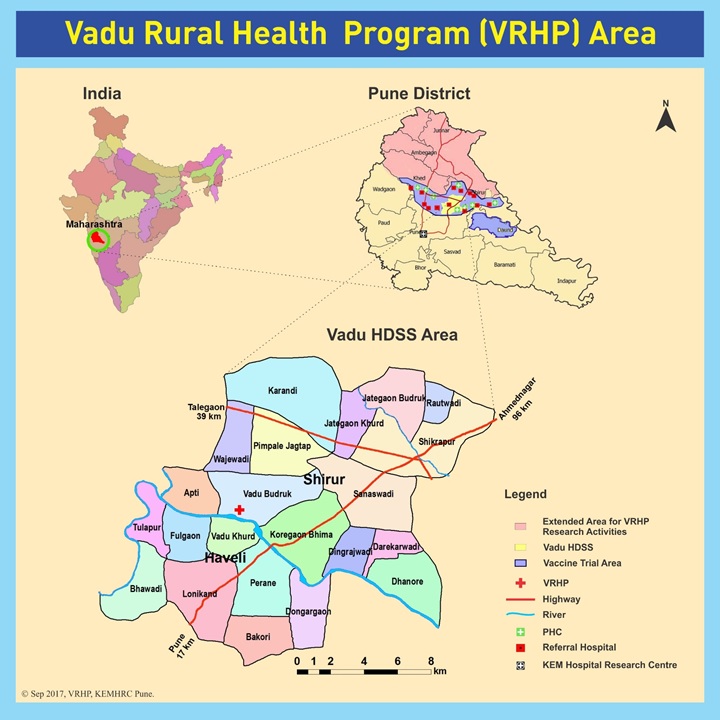Home
We are a not for profit organization which integrates a multi-disciplinary approach of extending quality health care to a rural population through service delivery and community-based research. We are situated in rural Pune district in Maharashtra State which is one of the more progressive states of India. It is a rural area situated about 32 km from Pune city.
Vadu Rural Health Program (VRHP)
The Vadu Rural Health Program, run under KEMHRC is now an internationally acclaimed research centre for its work and efforts in community health. It was initiated in the late 1970s. VRHP comprises of three pillars, Shirdi Saibaba Hospital, a 30-bed multi-disciplinary rural hospital provides secondary level medical care, Vadu Health and Demographic System and the Research.
Shirdi Sai Baba Rural Hospital, Vadu Bk
The Shirdi Sai Baba Rural Hospital, situated in Vadu Budruk village of Pune District, stands testimony to Dr. Banoo Coyaji’s dream and vision ‘To provide multi-disciplinary high quality yet sustainable preventive and curative medical care to rural underprivileged‘. Founded in 1981 under a tri-partite agree between for financial support from the Government of India, State Government of Maharashtra and the KEM Hospital Pune (partial support from Shamdasani Foundation, UK); this 30-bed rural hospital provides secondary level care to the 22 villages under the Vadu Rural Health Program and beyond. Today, the hospital run by the KEMH Pune has various specialists including Ophthalmologist, General Physician, Dentist, Ear-Nose-Throat Specialist, Gynecologist, General Surgeon and Pediatricians to provide quality medical care.
Health and Demographic Surveillance System
The Vadu HDSS is an independent system initiated in 2002 to monitor health trends, disease and vital events in the population served by the Vadu Rural Health Program. The surveillance system allocates a unique permanent identifier for each person residing in the 22 villages. A baseline was established in 2002. A household census conducted every six months enumerates all births, deaths and migrations. A verbal autopsy is conducted for all deaths that are then assigned a cause and ICD-10 code. The HDSS database complements hypothesis-driven research by providing socio-demographic information at the individual and household level that may be relevant to address specific research questions. The HDSS database links all research studies implemented in the Vadu HDSS through its unique identifier.

Research at Vadu
The Vadu Rural Health Program has a long and rich legacy of clinical trials, intervention studies, disease burden studies, and social science research in public health. The research portfolio is diversified and includes maternal and child health, women’s health, communicable diseases (measles, influenza, Dengue, Typhoid, COVID-19 etc), and non-communicable diseases.
Panel Discussion On Nomenclature of COPD: How important or relevant is it for India?
COVID-19 Update
1. Covishield study Read More...
2. COVOVAX study adults Read More...
3.COVOVAX Pediatric cohort study Read More...
4. Social drivers of acceptance and rejection of protective measures against Covid-19 infection in the community Read More...
5. Covid-19 Sero-Surveillance Studies Read More...
6. Support to Public Health System Read More...
7. Stakeholder Engagement Read More...







